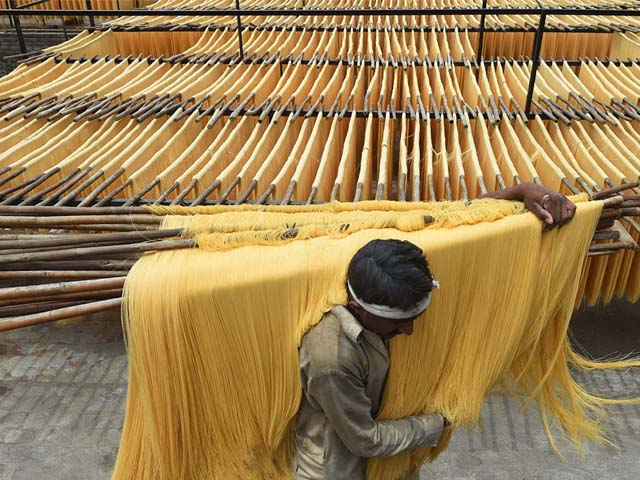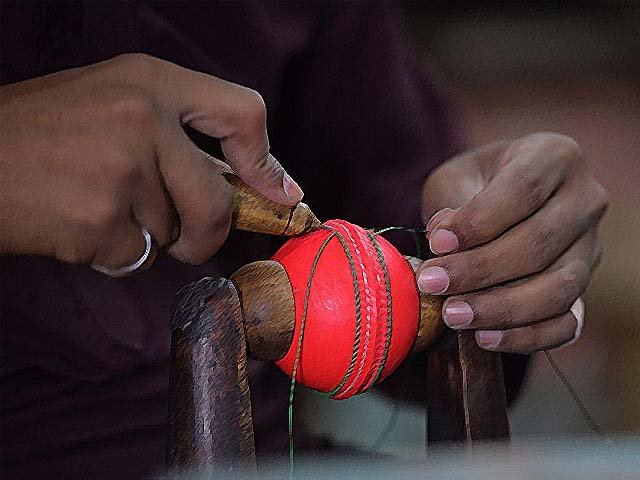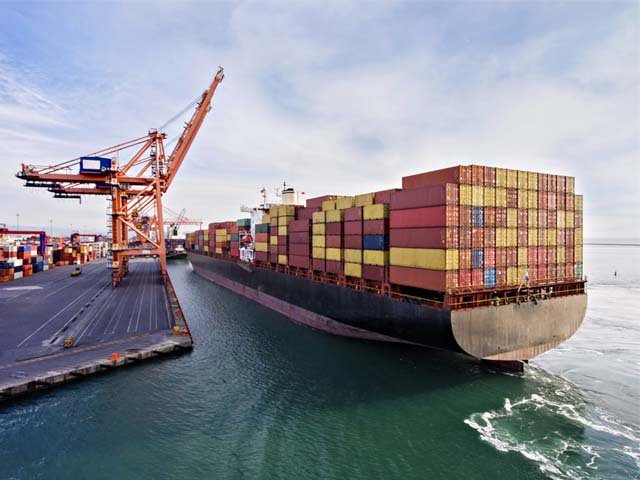
A Pakistan man carries thin vermicelli at a factory in Lahore.
PHOTO: GETTY
Is the international market interested in Pakistani products?
Ultimately, the success of these MSMEs will depend upon their access to the international market
The Indian government has encouraged the creation of Micro to Small to Medium Enterprises (MSMEs) in order to increase exports. The list of products that the Indian government has compiled recently for the MSMEs to consider and potentially engage trading in, is quite extensive. In a similar effort, a list of products has been compiled by our Ministry of Commerce. This article seeks to highlight the importance of choosing an appropriate product to export as well as gaining the initial set of customers for the relevant product.
Firstly, it is important to pay attention to a pattern that I was able to observe while working with Chinese MSMEs over a period of four years. The trend which I picked up upon was that these MSMEs would begin by simply trading products both locally and internationally. These products were usually rudimentary objects such as soaps, fruits and cheap fashion accessories, basically anything that these MSMEs could procure at a reasonable price with a convenient/stable supply, hence charging a fixed mark-up, enabling them to keep a modest profit margin.
However, in the Chinese context, due to the exchange rate disparity between the yuan and the dollar, it made more sense for these MSMEs to export rather than sell locally. Therefore, these MSMEs/traders advertised their products on Alibaba.com which essentially serves as the premier international marketplace for Chinese manufacturers/traders/SMEs which in turn allows them to communicate with potential clients, identify market gaps, obtain orders and export their products. These MSMEs fulfil smaller orders, patiently waiting for a larger order to arrive, one that would make it economically feasible for them to setup their own small manufacturing unit. In short, MSMEs bide their time, but their ultimate aim is always to switch from trading to manufacturing.
The idea that I am trying to propagate here is that the individuals, who are unemployed and really want to partake in something which is conducive to the economy, should strongly consider involving themselves in or setting up MSMEs in Pakistan. Unfortunately, the current MSME landscape primarily consists of companies engaged in importing from China and selling locally which only adds to our already burgeoning current account deficit. However, there is a long list of products that we can manufacture and in certain cases, already produce, but in limited quantities such as clothing and surgical items.
In the past, Pakistan was associated with the production of high quality sports goods but issues with the involvement of child labour hampered the growth of the industry. At present, Pakistan has the opportunity to recapture this market, especially after footballs manufactured in Pakistan were used in the FIFA World Cup 2018 which signified that our country is still seen as a dependable producer of sports goods in the international market.
It is important to remember that Pakistan's economy is still primarily based on agricultural products. Therefore, exports such as rice, vermicelli, mangoes and citrus fruits can also attract a sizeable demand from the foreign market if MSMEs are able to procure a supply chain system that is able to deliver perishable items relatively quickly. This has already been achieved by certain MSMEs who are selling fruits under their respective brands through social media channels. Other perishable items that can be brought into consideration are walnut cakes, organic jams made with regional fruits and organic eggs.
There are also certain luxury products which can be considered indigenous to Pakistan such as Himalayan salt lamps and bath salts. Additionally, luxury soaps made from the extract of Moringa trees can also interest the international market. Such niche products incur relatively low manufacturing costs, but can be sold at higher prices.
I highlighted in my earlier article that the government is already working on establishing a system for MSMEs to engage in micro level exports. Ultimately, the success of these MSMEs will depend upon their access to the international market which, in the modern day, revolves around the internet and online trading websites. However, new entrants must keep in mind that this is a road less travelled and therefore, there will be trying times during the initial periods. Setting up a business with a view to switch over into manufacturing is not, by any stretch of the imagination, easy, but if one remains steadfast and puts in the required effort, it can prove to be a very lucrative venture.




COMMENTS
Comments are moderated and generally will be posted if they are on-topic and not abusive.
For more information, please see our Comments FAQ